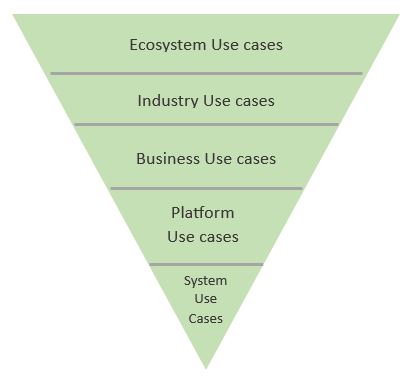Use Case A Term That Needs More Specific Coinage
The word “Use Case” has become the most sought-after term in business today than ever before and yet the most loosely used one. Advent of 5G and digital technologies are driving the quest for killer use cases like never before. More often than not organizations are trying to figure out what is the most profitable business case for the adoption of 5G technologies and other digital technologies for a particular offering/business. If you read the previous line carefully, there is an intersection of the use-case with business case and many times with business model as well. Although all being distinctly different, they are mentioned interchangeably many times.
With platform economy, in recent times the use cases may be as pragmatic as devising a new business strategy or a new business model, or adoption of a new digital technology like generative AI by an organization leading to devising system uses cases.
Use cases is a very common term in ICT and was an inherent part of traditional waterfall software development lifecycle methodology. Use cases are still used to specify the requirements of software systems and are defined before design work is started. They are also used to specify the requirements of embedded software systems.
In a very historical sense, a use case is defined as the sequences of interactions between the system under discussion and its external actors to achieve a particular goal. In which the system has responsibilities toward the stakeholders of the system, and capturing those responsibilities is part of the requirements-writing work.
Use cases are also used to capture the business process design of organizations, where the external actors are the customers and vendors of the company, and the processes of the organization are being documented or redesigned.
With advancements in how the technologies are impacting the ecosystems, industries, businesses and platforms, the use cases as a framework are extended to define more pragmatic scenarios definitions leading their way to adoption and implementation of these technologies into the new age platforms and systems. However, the way these use cases are defined and approached leads to a very different approach in writing these use cases and leveraging the outcomes for automations.
It only then makes sense to have further classifications to the use cases as eco-system use cases, industry use cases, business use cases, platform use cases and system use cases. In a hierarchical mode, plotting the digital use cases’ categories top-down use cases would generally look like an inverted pyramid where the ecosystem use cases will be on top and system use cases at the bottom.

Ecosystem use cases
Ecosystem use cases can be broadly classified as the use cases that are related to the adoption of digital technologies/platforms which change the ecosystem or the value chains across the industries. Some impacts of these use cases would be addition of a new actor in the value chain due to digital innovation or blurring/elimination of the earlier actors due to a new digital platform. These use cases are generally new digital business models and they change the existing economic value chain in the business ecosystem. In the context of telco transformation, being a cloud reseller or an ICT services provider would mean ecosystem use cases for telco. Within Industry4.0, non telco organizations acquiring bandwidth for their own private network to serve the connectivity of their own group of industries or companies will be an example of ecosystem use cases. Within telco transformation, the examples of the ecosystem use cases would be a telco offering cloud services, network as a service or other IT services.
Industry use cases
Industry use cases can be classified as the as the use cases that are related to the adoption of digital technologies/platforms to transform how the business is done within the industry or a value chain. It impacts the value chain within the said industry (either vertical or horizontal). This would require to define new digital business models and digital strategy. Smart factories, smart cities, smart healthcare etc. are the examples of these use cases. Within telco transformation, example of industry use cases would be connectivity as a service to say gaming industry. For telco ISVs, offering B/OSS as a service for instance would be an example of the industry use case.
Business use cases
Business use cases can be classified as the as the use cases that are related to the adoption of digital technologies by an organization to transform their existing business(products/services). This would usually mean digitalizing the existing processes, products and services. Adoption of AI/ML and data analytics to transform the business processes and operations would be an example of such a use case. Within telco transformation, common data lake for network as well as customers or autonomous networks would be an example of these type of use cases.
Platform use cases
Platform use cases can be classified as the as the use cases that are related to the creation of differing configurations of the platforms in order to support the higher level of digital use cases. Creation of a platform to offer NaaS, Content, super apps etc. These platforms use cases are guided by the superseding ecosystem or industry or business use cases that the organization or group of organizations define. Defining the platform use cases to enable an ecosystem use case of offering a wholesale marketplace for bundled services (5G slices, cloud SaaS applications, IoT Sims etc.) will be an example of Platform use case. The other example would be implementing a digital customer experience platform that will enable the business use case in this case.
System use cases
System use cases can be classified as the as the use cases that are related to the system implementation either within the platform or otherwise. Implementation of AI chatbot or generative AI use cases within the experience platform or in the CRM will be an example of system use cases.
Conclusion
Hence the level of the use case and its scope will dictate the nature of the detailing in the use case we are talking about. It also has the impact on what is covered by that use case and what is the expected outcome.

